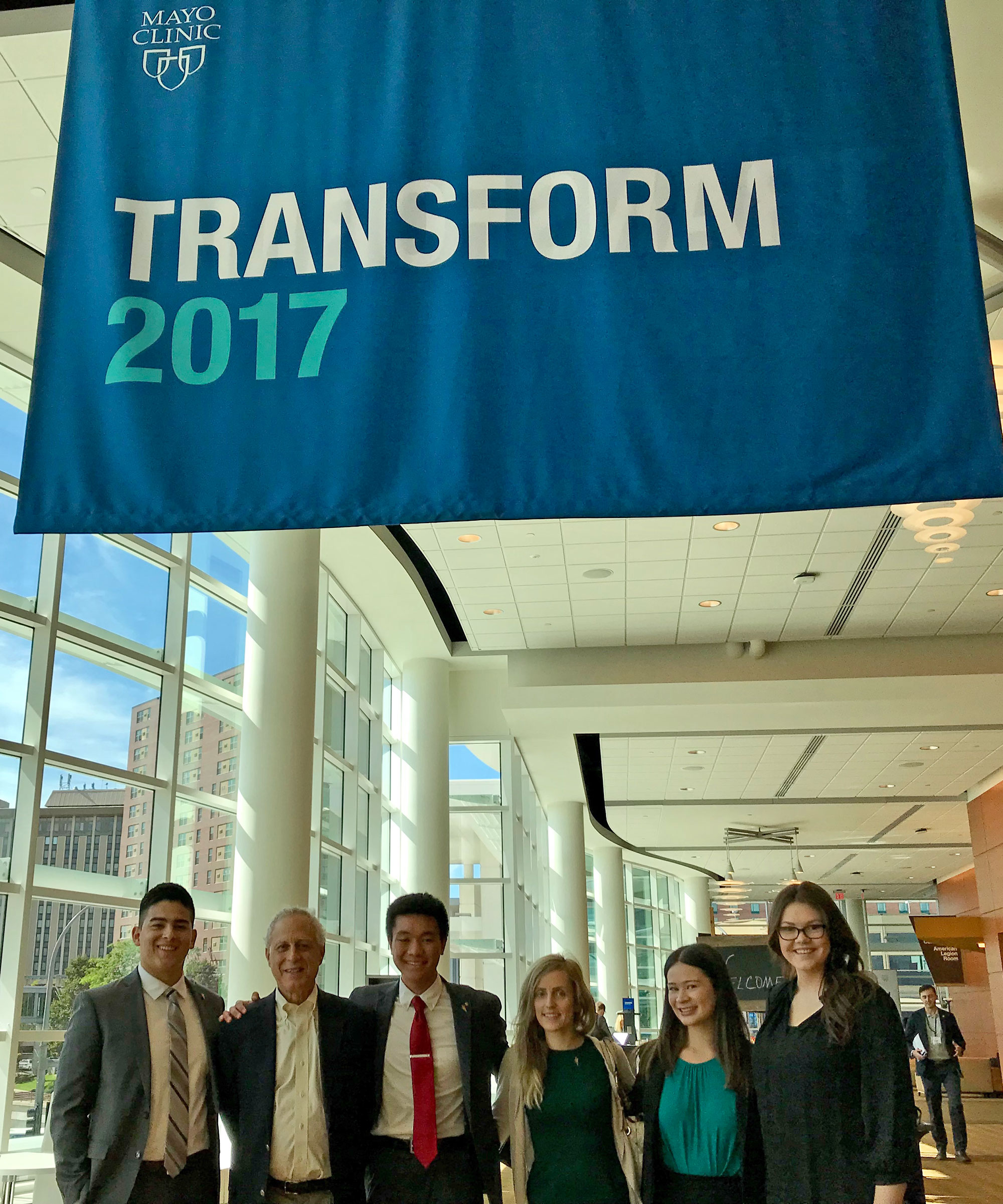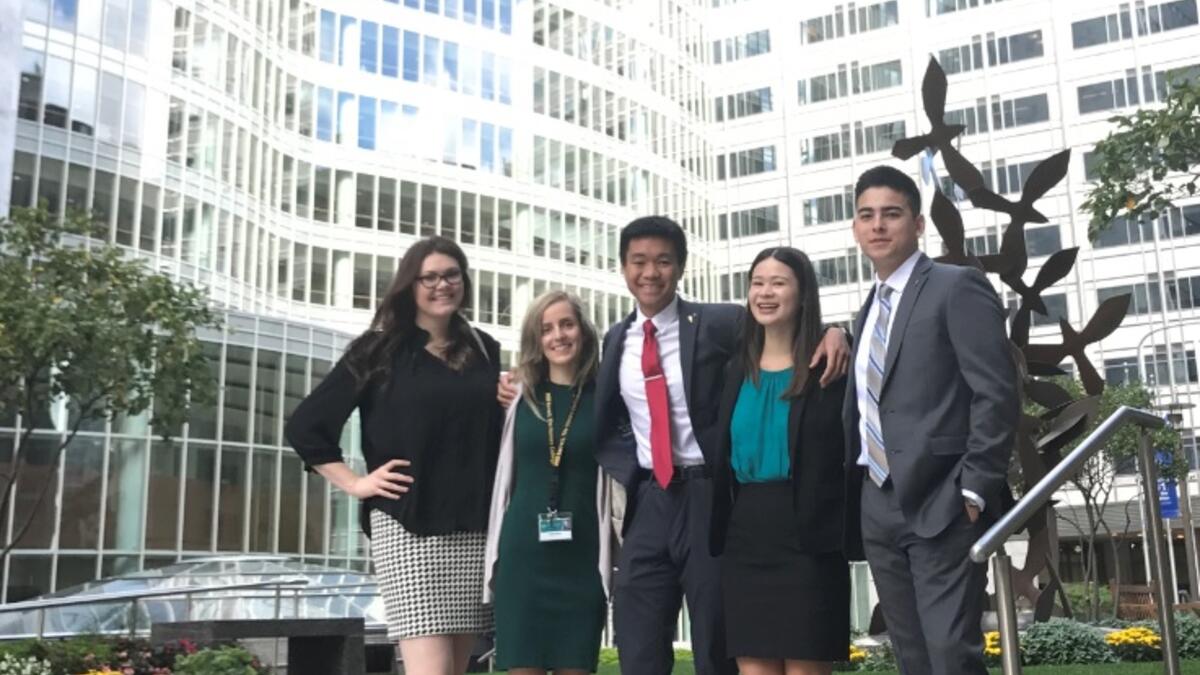With government leaders still undecided on the subject of national health care and the fate of millions of Americans hanging in the balance, Mayo Clinic Center for Innovation held its annual Transform 2017 conference in late September at its headquarters in Rochester, Minnesota.
Five Arizona State University students were selected to attend and be privy to a series of talks, debates and networking sessions with some of the world’s leading health-care professionals.
ASU and Mayo Clinic have been working together for 12 years on programs that range from nursing to medical imaging to regenerative and rehabilitative medicine to wearable biosensors.
Last fall, the duo formalized their relationship through the creation of Mayo Clinic and Arizona State University Alliance for Health Care, and earlier this summer, Mayo Clinic School of Medicine welcomed its first cohort of 50 students in Scottsdale. Students at the Scottsdale campus are guided by a jointly developed curriculum focused on the science of health care delivery, taught by both ASU and Mayo Clinic faculty.
David Sklar, senior adviser and professor at ASU’s School for the Science of Health Care Delivery, also attended Transform 2017. An accomplished MD, Sklar came to ASU by way of the University of New Mexico, where he served as program director for the emergency medicine residency, chair of the emergency department, senior associate dean for clinical affairs and, most recently, associate dean for graduate medical education.
Sklar is also the author or co-author of more than 150 articles in medical literature on topics such as medical error, quality improvement, medical education, international health, and literature and medicine, and he serves as editor-in-chief of Academic Medicine, the leading journal in medical education, sponsored by the Association of American Medical Colleges.
“More and more [in health care], we’re bringing in knowledge from other related fields,” Sklar said to the students as they gathered for lunch one day during the conference. “Psychology, anthropology, bioengineering. Lots of different places.
“I think one of the really unique things about Mayo is that everybody really works together and there’s great collaboration. And one of the really great things about ASU is there are so many different areas that we train people in, and I think there’s real opportunity to bring all of that into health care.”
Read on to learn more about the students chosen to attend, what they think of ASU and Mayo’s approach to health care and health-care education, and what role they hope to play in it all.

ASU Professor David Sklar (second from right) and ASU students (from left) Randall Arroyo, Daniel Nguyen, Julia Lorence, Alicia Darwin and Megan Feith. Photo by Emma Greguska/ASU Now
Daniel Nguyen — Biomedical Sciences, College of Liberal Arts and Sciences; Barrett, The Honors College; Flinn Scholar
Daniel Nguyen always knew he wanted to help people for a living. So during high school, he signed up for an EMT program — and hated it.
“I thought medicine wasn’t for me,” he said. “The hours were bad, some of the patients [were difficult]. Everything was pretty rough.”
Then came “that one call.” Nguyen’s team was responding to a report of a young girl who had been attacked by a dog. When they pulled up in the firetruck, her mother ran out to them and exclaimed, “Thank God you’re here!”
“That one line, that ‘Thank God you’re here,’ that made me go, this is worth it,” he said. They helped the girl to the hospital, where she eventually recovered, and Nguyen started his medical journey anew.
As a freshman at ASU, he studies biomedical science and volunteers at the Student Health Outreach for Wellness clinic (SHOW), a tri-university, student-led initiative providing free health care and education for individuals experiencing homelessness in Phoenix.
A major theme at Transform 2017 was the social determinants of health. At SHOW, Nguyen said, a lot of the patients “just happen to be caught in bad circumstances and … because of that, their health suffers. … So it’s good that we have places like [SHOW] to help them.”
He found the conference and the overall spirit of Mayo Clinic to be very inspiring.
“Mayo Clinic truly puts the needs of patients first,” he said. “And that’s really amazing.”
Randall Arroyo — Kinesiology, College of Health Solutions; Barrett, The Honors College
Randall Arroyo comes from a law-enforcement family, with a father who has 30 years in the field. He figured it’s what he’d do too, until he volunteered in the emergency department of a hospital as a sophomore in high school.
“I’ll never forget, my first day, we had a codeDoctors often use the term “code” to refer to a patient in cardiopulmonary arrest. within maybe the first 20 minutes that I was there,” he said.
“I had no idea what was happening, I just stood in the back watching. Unfortunately, the lady didn’t make it.”
Arroyo was deeply affected by what he saw but was heartened at the sight of so many doctors and nurses coming together in what he called an “organized chaos” to do everything they could to help someone. That was the moment that put him on the path toward medicine.
Nowadays, he’s a junior at ASU studying kinesiology and working as a scribe for emergency medicine doctors at Banner Estrella and Banner Desert Medical Center in Phoenix. He follows the doctors throughout their shifts, sitting in the room with the patients and observing the entire treatment process.
“I love every second of it,” Arroyo said. “I’ve learned more in the last five months that I’ve been doing it than I could have ever imagined.”
Alicia Darwin — Biochemistry, College of Liberal Arts and Sciences; Barrett, The Honors College
Alicia Darwin had never heard of Transborder Chicana/o and Latina/o Studies before coming to ASU, but now the biochemistry senior is minoring in the subject. She wants to use what she learns to address minority health care and reduce health-care disparities.
“I don’t think that we currently do a good job of giving people treatment that fits into their culture or way of life,” Darwin said. “If you just try to solve the problem that’s immediately at hand, you’re not taking [the whole person] into consideration, and you have to treat the whole person as opposed to just their disease.”
As a student at ASU, she was able to shadow an oncologist at the Mayo campus in Scottsdale.
“Something I noticed [there] was that they did a really good job of that [a more holistic approach],” she said, recalling cancer patients who reported seeing dieticians and going to support groups in addition to their medical treatment.
Darwin hopes to one day work at a Mayo facility herself.
“I just really like the atmosphere of Mayo Clinic,” she said. “Giving patients that kind of support is really important.”
Julia Lorence — Biomedical Sciences, College of Liberal Arts and Sciences; Barrett, The Honors College
Julia Lorence was born and raised in Germany. Her first love was dance, and she received a degree in ballet and a minor in dance therapy. Then she suffered a stroke.
She had complained of symptoms to her local doctors, but they always told her the same thing: There was nothing wrong. After her stroke, doctors at an overseas military hospital operated by the U.S. were able to treat her. Afterward, she decided to pursue medicine in America.
Now a junior in biomedical sciences at ASU, Lorence is conducting research on brain tumors at the Mayo campus in Scottsdale and has become enamored with the medical facility and its unique approach to health care.
“I felt like I was just a number with my original doctors,” Lorence said of her experience with her stroke. “If they had been more diligent, maybe that wouldn’t have happened to me.”
Mayo Clinic, she feels, is diligent and so much more.
“I would love to attend Mayo Clinic School of Medicine,” she said. “I love the teamwork. Having shadowed different physicians, you can see the collaboration. I shadowed at different hospitals where there’s a lack of teamwork and collaboration. [At Mayo] you can really sense that there’s a family and a unity for the best of the patient.”
Megan Feith — Doctor of Nursing Practice, pediatric emphasis, College of Nursing and Health Innovation
Megan Feith is one of only six graduate students in the pediatric nursing specialty program at ASU’s College of Nursing and Health Innovation. Children’s health care has always been her passion.
“I only do kids,” she said with a laugh.
Feith also completed her bachelor’s in nursing at ASU, meaning she has spent a lot of time doing clinical work at various medical facilities in the Valley.
“ASU builds such strong relationships and partnerships with the surrounding community, that’s why people want their students,” she said. “They know they’re good.”
Having just passed her nursing license exams last month, Feith is excited to get started in the field. Something she learned from Mayo that she plans to bring with her is “how to build meaningful relationships with patients.”
Top photo: ASU students (from left) Megan Feith, Julia Lorence, Daniel Nguyen, Alicia Darwin and Randall Arroyo. Photo by Grace O'Sullivan
More Health and medicine

The surprising role of gut infection in Alzheimer’s disease
Arizona State University and Banner Alzheimer’s Institute researchers, along with their collaborators, have discovered a surprising link between a chronic gut infection caused by a common virus and…

ASU, University of Wisconsin partner to empower Black people to quit smoking
Arizona State University faculty at the College of Health Solutions are teaming up with the University of Wisconsin to determine which treatments work best to empower Black people to quit…

New book highlights physician wellness, burnout solutions
Health care professionals dedicate their lives to helping others, but the personal toll of their work often remains hidden.A new book, "Physician Wellness and Resilience: Narrative Prompts to Address…
